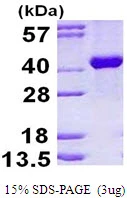
3microg Human Aldolase B protein (GTX67210-pro) by SDS-PAGE under reducing condition and visualized by coomassie blue stain.
Human Aldolase B protein, His tag
GTX67210-PRO
Product group Molecular Biology
Overview
- SupplierGeneTex
- Product NameHuman Aldolase B protein
- Delivery Days Customer9
- CertificationResearch Use Only
- Concentration1 mg/ml
- ConjugateUnconjugated
- Scientific DescriptionFructose-1,6-bisphosphate aldolase (EC 4.1.2.13) is a tetrameric glycolytic enzyme that catalyzes the reversible conversion of fructose-1,6-bisphosphate to glyceraldehyde 3-phosphate and dihydroxyacetone phosphate. Vertebrates have 3 aldolase isozymes which are distinguished by their electrophoretic and catalytic properties. Differences indicate that aldolases A, B, and C are distinct proteins, the products of a family of related housekeeping genes exhibiting developmentally regulated expression of the different isozymes. The developing embryo produces aldolase A, which is produced in even greater amounts in adult muscle where it can be as much as 5% of total cellular protein. In adult liver, kidney and intestine, aldolase A expression is repressed and aldolase B is produced. In brain and other nervous tissue, aldolase A and C are expressed about equally. There is a high degree of homology between aldolase A and C. Defects in ALDOB cause hereditary fructose intolerance. [provided by RefSeq, Dec 2008]
- Storage Instruction-20°C or -80°C,2°C to 8°C
- UNSPSC12352204
